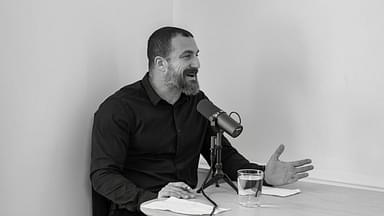Pain is part and parcel of the fitness world, with every step holding the potential towards hurt. However, some tools could help in effective pain management, ranging from those that provide temporary relief to those that need consistent practice. Neuroscientist Dr. Andrew Huberman elaborates on this.
In his recent podcast, Dr. Huberman teams up with anesthesiologist and pain medicine specialist Dr. Sean Mackey to talk about pain and the circumstances surrounding it. This includes chronic pain and the tools one could utilize to manage it.
Chronic pain doesn’t behave like regular pain inflicted by temporary injuries. It is long-standing and persists beyond the average recovery period. To deal with it efficiently, Dr. Mackey provides three tools that one could utilize in their day-to-day life. One could use attentional distraction, mindfulness-based stress reduction, or cognitive-behavioral therapy.
Attentional distraction involves participating in activities that get the mind off the pain. These could include reading, going for walks, socializing, and so on. However, it only works during the day, not at night, when distractions are difficult to come by.
“You can’t distract yourself at night when you’re trying to get into a relaxed state and fall asleep, and that’s why sleep is such a big issue for people with chronic pain.”
During such situations, Dr. Mackey recommends mindfulness-based stress reduction. This helps accept the pain in a non-judgmental manner. The chronic pain sufferer accepts the presence of the pain without putting a value on it. There is a third aspect similar to this that focuses on cognitive-behavioral therapy.
“You’re making effort on what you’re thinking of the pain. Is that pain damaging, threatening, harmful, or do you view it as ‘yeah it hurts but it’s not harming me.’ That is a critical aspect of pain management.”
In the end, no matter what pain management tool one uses, it involves training the mind to a certain extent. Mental strength plays an integral part in body functions and physical changes. Even fitness-based processes, such as weight management require a considerable amount of mental work.
Dr. Andrew Huberman and David Goggins mull over weight loss techniques
David Goggins is an endurance athlete, ex-Navy SEAL, and motivational speaker. But before achieving huge milestones, Goggins needed to cross the hurdle of losing 100 pounds. And he did that in three months. The athlete revealed his secret in Dr. Huberman’s previous podcast episode.
View this post on Instagram
The key was to listen to oneself instead of others. Goggins explained that, despite many calling him crazy for his goal, he was successful because he listened to himself. A strong will is cultivated, not gifted. Therefore, no matter what the goal is, mental strength is the key.





